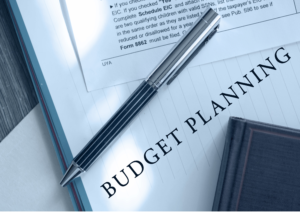| What is a budget? | Who is a budget suitable for? | Wants Vs Needs | Importance of Budgeting | How to create an effective budget |
How to make a simple monthly budget with these easy and simplified steps.
What is a budget?
Whether you earn an income or receive pocket money or both, it’s always a good idea to make smart financial decisions. Making a budget is one such decision.

A budget is simply a breakdown of the allocation of your income, to meet your wants and needs, and future uses, for a given period of time.
Nerdwallet.com also defines a budget as “…budget is a way to balance income, expenses, and financial goals for a specific length of time”.
A monthly budget refers to a monthly breakdown of your monthly needs and wants from the money you have to spend for that time.
I wasn’t always smart with my money. Subconsciously, my heart knew to be smarter, but could never come around to actually sort out my financial state. I also didn’t realize the value of money and simply didn’t care.
It’s obvious I didn’t come from a financially prudent family. My parents didn’t have any defined financial habits so this subconsciously became my MO.
However, I am grateful for the ability to learn at any given point. I realized I wasn’t going to achieve any of my goals without money. I had so many unrefined business plans then, but a little education helped me brush up on my financial habits.
WHO SHOULD MAKE A BUDGET?
Accordingly, no one is too young or too old for budgeting. Parents with good knowledge of finance usually pass on such knowledge consciously and otherwise to their children.
Undoubtedly, families should make budgets for their monthly expenditures. Individuals of all ages and income brackets use budgets to cater to their personal finances.
Businesses and corporations use budgets to allocate resources for operations. Countries implement budgets yearly to run the economy.
Likewise, individuals make a monthly budget for their needs according to how much they earn and what they need and want every month.

Why Make A Budget?
- Accountability. Budgeting helps you stay accountable for your expenses and income. You know what your income was spent on at all times.
- Confidence in financial decisions. This is self-explanatory. When you work with a budget, you make better choices with your money to help hit a target of maintaining balance.
- You know your saving capacity and buying capacity this way you can avoid debts and other money traps.
- A budget is a good exercise for financial prudence. It helps everyone identify their wants and needs. It helps establish financial accountability.
- A budget helps create wealth through compounding.
- A budget will help you achieve important life goals.
Identifying wants vs needs
Basically, “wants” are desires you can do without. “Needs” are things you can’t do without, necessities needed to function properly daily.
When budgeting, it is very crucial to differentiate your wants from your needs.
“Wants” include things like the latest fancy pair of shoes or shopping for the latest Dior beauty makeup collection, etc. You can live without them.
Contrarily, needs include food, Water clothing shelter, health, education, etc.
Your needs should be rightly prioritized. You can write down your wants and needs in a book to help make things easier.
my top tips for making a budget: how to make a simple monthly budget
1. IDENTIFY YOUR SOURCE OF INCOME:

Firstly. before embarking on the journey of budgeting, it is necessary to honestly and concisely establish and recognize your source of income.
Do you get money from a day job?
Do you get money from working several jobs?
Allowance from your parents?
Do you get money from your business? Are you an entrepreneur?
Whatever it is you do that generates income for you is your source of income. Therefore, it is important that you identify your source of income. Afterward, ascertain how much you make from this source at the end of a given period.
This helps determine how much you allocate to items in your budget. Your budget should never be bigger than your income and you should always allocate money to save first.
Related: How to improve your productivity
2. WRITE OUT YOUR MONTHLY EXPENSES.

On a clean sheet of paper, draw two columns. Label one expense and label the other income.
Write out an honest list of everything you expend your money on per month.
Under the expenses, list out all your needs for the month such as stationary, toiletries, food, etc. As well as all the wants, and desires you financially indulge in monthly.
3. CREATE A SCALE OF PREFERENCES.
Basically, a scale of preference is a table that shows your needs and wants from most important to least important.
Make sure, to be honest when writing out all your wants and needs and arrange them by necessity: most necessary to least necessary. Ensure you indicate the most necessary ones from the least necessary ones.
4. NEVER OVERLOOK YOUR HEALTH.

Famously, health is wealth, and rightly so. Certainly never take your health for granted. Every month allocate funds for health care and get health insurance and money for healthy food items. You may find that it could be overall cheaper than eating out.
5. Purposefully minimize Your Expenditure:
When making a budget, make it a goal to curb expenses. All things that are actually pretty unnecessary. This varies significantly from person to person.
Admittedly, it is quite challenging to not indulge in retail therapy after a stressful month. No “spoiling” yourself a little. You should take care of yourself without a doubt. However, you can’t quite “spoil” yourself yet. Especially if you’re earnings are on a low scale.
Things that could be silently taking your money without returning any value such as monthly subscriptions to services you barely consume. Also, wasting water, gas, electricity, internet, etc. should be intentionally curbed to boost your savings.
6. SAVE MORE:

Save more money whenever you can. No amount of money is literally too little to save.
When it comes to savings, compounding is the secret key. Each month as you earn income, you pay yourself first by saving.
Naturally, income is divided into taxes, consumption, investment, and savings.
(Income = consumption+ investment + savings – taxes)
When your taxes are deducted, you’re left with consumption, investment, and savings.
Most low-income earners can’t invest but can save even if in trickles. Something is quite better than nothing. Save by engaging in more DIYs products.
7. SET FINANCIAL GOALS.
This can be a source of motivation to save more.
For instance, you can set a goal to save 40% of your monthly income for a period of 12 months (1 year).
You can decide to save a certain percentage of your money income for an extended period of time. Maybe to occasionally afford a certain asset or luxury or utility, etc. Have fun challenging yourself with new boxes to tick off your list.
8. KEEP A LOG OF YOUR CASH INFLOW AND OUTFLOW:
As the month progresses, make an account of your daily expenditure and every source of income you’ve acquired. Actually, write it down not making mental notes😆.
Emphatically keep track of your daily expenses. Has it exceeded your budget or are you still in line?
Contrarily, weigh both income and expenditure to note if one is greater than the other. Your income should never be less than your expenditure, therefore, adjust promptly.
9. PRACTICE FRUGAL LEAVING.
This is one sure way to achieve your financial goals faster. Absolute financial discipline.
Being absolutely intentional with your money. Focus on the rationality behind spending money. Prioritize only the things that matter the most to you, doing what you can do without, etc.
Frugal living focuses on value. I.e best-value purchases at least-cost prices, low-cost great experiences, etc. And saving as much as you can from your budget cuts. Buy what you can afford.
10. PASSIVE SOURCE OF INCOME.
From the money you saved for months, you can invest a portion or all of it into a viable source of passive income.
However, please conduct market research beforehand on whatever market you’re entering. Measuring your risk tolerance, (you do want to acknowledge how much you’re willing to risk in business because it always gets rocky).
11. NEVER LEAVE OUT UNFORESEEN CIRCUMSTANCES, CREATE EMERGENCY FUNDS
Life is unpredictable and unwanted things happen. You need to keep the money for this precautionary reason. If you make no attempts to prepare for unforeseen events then all your hard work might just be in vain.
12. ALLOCATE YOUR FINANCES rationally.
What percentages of the full income get allocated to what needs?
Most people keep half of their money for savings and share the remaining half for feeding, transportation, etc.
I personally use a 35:65 ratio for my income distribution. 35% goes to savings, and 65% is allocated to my scale of preference.
Feeding normally takes the greater portion of the 65%, especially given the current inflation. Bills, rent, medicine, ICE funds, data, electricity, water, skincare, hair, clothing (only every 1/3 months), etc.
Budgeting can be a fun challenging experience. Especially when there’s something to be gained from the sacrifices.
At the end of a year, you will see a difference between your financial status post and pre-budget planning. Getting some financial education on what to do, the next steps to take, understanding investment, businesses, etc.
Spend some quality time alone to make better decisions for yourself
